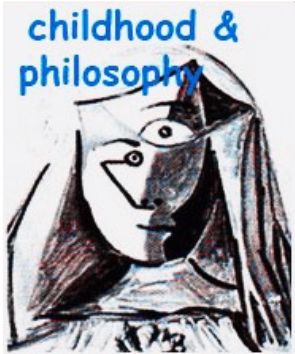citizenship and community in the western democratic context: philosophical-educational analysis
DOI:
https://doi.org/10.12957/childphilo.2023.73888Keywords:
community-based philosophical practices, philosophy for children (P4C), civic education, community, responsibilityAbstract
This paper endeavors to carry out a philosophical analysis of the current state of civic education in Western democracies, in order to deal with the problematic dualism between extreme individualism and endogamic communitarianism, which alters the relational modalities and specific lifestyles that characterize human plurality. As such, the intention of this article is to understand how the formation of citizens supported by the practice of philosophy can cultivate a dialogical, open, and pluralistic community capable of facing this duality. For this purpose, we carried out a systematic and critical analysis of books and articles that, in dealing with the relationship between the individual and the community, aim to overcome the above-mentioned problematic dualism. Among the results of this study, we found that Matthew Lipman and Ann Sharp’s Philosophy for Children (P4C) program contributes significantly to the empowerment of citizens, and supports the development of their ability to engage in dialogue in search of creative and ethical solutions in the diverse circumstances of daily life. Moreover, P4C contributes to the achievement of communities characterised by solidarity, plurality, openness, and self-correction, and which are oriented toward the rigorous search for the common good. Therefore, we conclude that community-based philosophical practices such as P4C can contribute to civic education and the formation of responsible citizens, offering a possible paradigm to develop the humanistic axis of the individual and promote openness to diversity.Downloads
References
BAUMAN, Z. Comunidade: A busca por segurança no mundo atual. Rio de Janeiro: Jorge Zahar, 2003.
BIESTA, G. J. What kind of Citizen? What kind of Democracy? Citizenship Education and the Scottish Curriculum for Excellence. Scottish Educational Review, v. 40, n. 2, p. 38-52, 2008.
BIESTA, G. J. Good Education in an Age of Measurement. Boulder: Paradigm, 2010.
BIESTA, G. J. Para além da aprendizagem: educação democrática para um futuro humano. Belo Horizonte: Autêntica Editora, 2013.
BIESTA, G. J. Touching the Soul? Exploring an Alternative Outlook for Philosophical Work with Children and Young People. childhood & philosophy, v. 13, n. 28, p. 415-452, 2017.
BLEAZBY, J. Autonomy, Democratic Community, and Citizenship in Philosophy for Children: Dewey and Philosophy for Children’s Rejection of the Individual/Community Dualism. Analytic Teaching, v. 26, n. 1, p. 30-52, 2006.
BLEAZBY, J. Social Reconstruction Learning: Dualism, Dewey and Philosophy in Schools. New York: Routledge, 2013.
BURGH, G.; THORNTON, S. Teaching Democracy in an Age of Uncertainty: Place-Responsive Learning. Abingdon-New York: Routledge, 2022.
DEWEY, J. Democracia e educação. 4. ed. São Paulo: Companhia editora nacional, 1979.
ESPOSITO, R. Communitas: The Origin and Destiny of Community. Stanford: Stanford University Press, 2010.
FITZPATRICK, M.; REED-SANDOVAL, A. Race, Pre-college Philosophy, and the Pursuit of a Critical Race Pedagogy for Higher Education. Ethics and Education, v. 13, n. 1, p. 105-122, 2018.
FREIRE, P., Pedagogia do oprimido, 75. ed. Rio de Janeiro: Paz e Terra, 2020.
HOYER, T. Formação como cidadania ou: para que formação? In: DALBOSCO, C. A.; MÜHL, E. H.; FLICKINGER, H.-G. (orgs.). Formação Humana (Bildung): despedida ou renascimento? São Paulo: Cortez, p. 143-158, 2019.
HUNG, R. Being Human or Being a Citizen? Rethinking Human Rights and Citizenship Education in the Light of Agamben and Merleau-Ponty. Cambridge Journal of Education, v. 42, n. 1, p. 37-51, 2012.
JONAS, H. O princípio responsabilidade. Rio de Janeiro: Contraponto, 2006.
KOHAN, W. Paulo Freire and Philosophy for Children: A Critical Dialogue. Studies in Philosophy and Education, v. 37, p. 615-629, 2018.
LINGUA, G.; MONTI, P. Community. In: FRANZINI TIBALDEO, R.; LINGUA, G. (orgs.). Philosophy and Community Practices. Berlin: Peter Lang, p. 39-50, 2018.
LIPMAN, M. Thinking in Education. 1. ed. New York: Cambridge University Press, 1991.
LIPMAN, M. O pensar na educação. Tradução: Ann Mary F. Perpétuo. Petrópolis: Vozes, 1995.
LIPMAN, M. Natasha: Diálogos Vygotskianos. Porto Alegre: Penso, 1996.
LIPMAN, M. Thinking in Education. 2. ed. Cambridge: Cambridge University Press, 2003.
LIPMAN, M. A Life Teaching Thinking. Upper Montclair: IAPC, Montclair State University, 2008.
NUSSBAUM, M. Sem fins lucrativos: Por que a democracia precisa das humanidades. São Paulo: Martins Fontes, 2017.
PULCINI, E. Care of the World: Fear, Responsibility and Justice in the Global Age. Dordrecht: Springer, 2013.
REDAÇÃO RBA. Política higienista de Doria faz população de rua se sentir “refugiada no próprio país”. Rede Brasil Atual, 8 fev. 2017. Disponível em: https://www.redebrasilatual.com.br/cidadania/2017/02/politica-higienista-de-doria-faz-populacao-de-rua-se-sentir-como-refugiados/. Acesso em: 26 fev. 2023.
REED-SANDOVAL, A.; SYKES, A. C. Who Talks? Who Listens? Taking “Positionality” Seriously in Philosophy for Children. In: GREGORY, M.; HAYNES, J.; MURRIS, K. (orgs.). The Routledge International Handbook of Philosophy for Children. Abingdon-New York: Routledge, p. 219-226, 2017.
REED-SANDOVAL, A. Can Philosophy for Children Contribute to Decolonization? Precollege Philosophy and Public Practice, v. 1, p. 27-41, 2019.
SÄFSTRÖM, C.-A.; BIESTA, G. J. Learning Democracy in a World of Difference. The School Field, v. 12, n. 5-6, p. 5-20, 2001.
SHARP, A. M. Philosophical Teaching as Moral Education. Journal of Moral Education, v. 13, n. 1, p. 3-8, 1984.
SHARP, A. M. What is a ‘Community of Inquiry’ (1987). In: GREGORY, M.; LAVERTY M. (orgs.). Community of Inquiry with Ann Margaret Sharp: Childhood, Philosophy and Education. Abingdon-New York: Routledge, p. 38-48, 2018a.
SHARP, A. M. A Letter to a Novice Teacher: Teaching “Harry Stottlemeier’s Discovery” (1992). In: GREGORY, M.; LAVERTY M. (orgs.). Community of Inquiry with Ann Margaret Sharp: Childhood, Philosophy and Education. Abingdon-New York: Routledge, p. 88-95, 2018b.
SHARP, A. M. The Role of Intelligent Sympathy in Educating for Global Ethical Consciousness (1995). In: GREGORY, M.; LAVERTY M. (orgs.). Community of Inquiry with Ann Margaret Sharp: Childhood, Philosophy and Education. Abingdon-New York: Routledge, p. 230-240, 2018c.
WALDENFELS, B. Phenomenology of the Alien. Basic Concepts. Evanston: Northwestern University Press, 2011.
YOUNG, I. M. The Ideal of Community and the Politics of Difference. Social Theory and Practice, v. 12, n. 1, p. 1-26, 1986.




